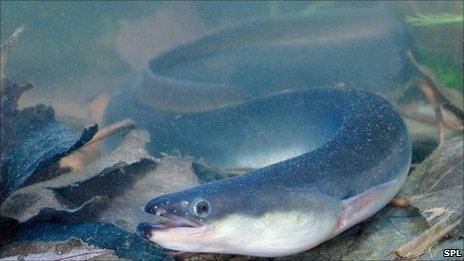Eels assist Loch Ken crayfish fight
- Published

Eels could be given a key role in controlling the number of American signal crayfish on a Scots loch.
Loch Ken in Dumfries and Galloway has seen fish stocks suffer as the levels of the non-native species have risen significantly in recent years.
A five-month trapping programme last year caught and killed more than 700,000 crayfish in its waters.
European eels are a natural predator to young crayfish and plans are being developed to boost their numbers.
The signal crayfish has been blamed for eating young fish in the area and destroying their habitat.
They were introduced to waters in England and Wales through fish farms about 20 years ago.
In Scotland, they were first recorded in the catchment of the River Dee in Kirkcudbrightshire in the mid 1990s.
By 2004 they were found in waters near Loch Ken and started to be reported as a nuisance by anglers in the area.
The crayfish population is now the largest known in Scotland and local businesses have complained about the loss of revenue due to a decline in fishing trips to the area.
A Scottish government-funded five-month research project by Marine Scotland trapped and killed more 700,000 of the non-native species.
Now funding is being sought to continue the project on a three-year basis at a cost of about £700,000.
It is estimated that income generated by people using the loch for angling and boating exceeds £740,000 a year.
However, that spending could be affected by the rising numbers of crayfish.
Now the Galloway Fisheries Trust and Scottish Power, which has hydro-electric schemes in the area, have drawn up proposals to help encourage European eel populations in the loch.
It is hoped the "major natural predator" of young crayfish could play a part in maintaining the "ecological balance" of the loch and surrounding area.
The method would be used alongside a trapping programme which initial research has shown has had a "significant impact".
Researchers believe there is strong public support from local and visiting anglers for further work.
One remaining "key issue" surrounds the disposal of the large number of crayfish being caught and killed using an industrial boiler.
- Published24 December 2009
- Published16 August 2008
- Published4 March 2008
- Published22 February 2007
- Published21 July 2006